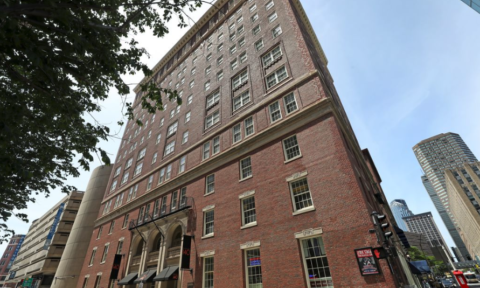Boston Globe
December 9, 2021
A collection of politicians and developers gathered in the Back Bay Thursday to celebrate the start of work on one of the more notable affordable housing developments Boston has seen in years.
It’s the conversion of the old YWCA building at the corner of Clarendon and Stuart streets into 210 low-cost apartments, more than half of which will be reserved for formerly homeless people who’ll receive services from the Pine Street Inn. The rest will be more traditional affordable housing.
Led by Mount Vernon Co. and Beacon Communities, the project will rehab the century-old building — which in recent years included a hotel, apartments, and several nonprofit and commercial tenants — into affordable housing in one of Boston’s swankiest neighborhoods. YW Boston, as the YWCA is now known, put its longtime home up for sale in 2019, hoping to capitalize on the city’s hot real estate market. A deal to convert it to higher-end market-rate housing fell through early in the COVID-19 pandemic, and Mount Vernon and Beacon — one of the city’s largest affordable housing operators — stepped in with this plan.
They paid roughly $52 million to buy the building, according to deeds filed in Suffolk County last month, and cobbled together an array of federal, state, and local financing to cover the $100 million-plus project. The developers will partner with Pine Street to provide services such as case management and mental health counseling to formerly homeless residents. And, when it’s done in 2024, tenants including The Lyric Stage, Snowden International School, and YW Boston will stay in the building.
Among those on hand for the event Thursday were Governor Charlie Baker and Boston Mayor Michelle Wu. Baker pointed to the cooperation from a wide range of partners to make the development happen.
“This project is a great example of public and private partners coming together to deliver a unique asset to the neighborhood by maintaining a cultural institution and providing a solution to homelessness: housing with services for our most vulnerable neighbors,” he said in a statement.
This so-called permanent supportive housing has increasingly become a focus of homeless service agencies in Boston as a way to help people get off, and stay off, the streets. Pine Street is building a similar project in Jamaica Plain in partnership with The Community Builders, and just this week the Yawkey Foundation announced a $15 million donation to Pine Street for more developments like this.
Wu on Thursday said her administration will continue to push these sorts of developments as the city emerges from the pandemic and grapples with an ongoing homelessness crisis.
“Housing is health. Housing is safety and opportunity,” she said at Thursday’s event. “And it must be the foundation of our recovery from the pandemic.”

